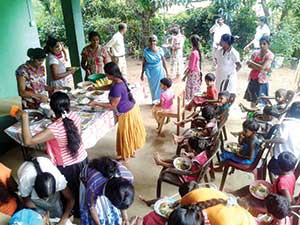The Skills Development Centre (SDC) at the Half Way Home in Mulleriyawa, which used to be called Unit 2, have today around 300 women resident in long term Psychiatric care.
Many have lived before this at Angoda Hospital, which is now called The National Institute of Mental Health (NIMH), Angoda.
Altogether, that is at the Halfway Home and NIMH, some women may have lived for as long as 34 years. Many of them are rejected and distanced from their families and friends for ever. But for the work of Doctors, Nurses, Attendants and other Half Way Home staff these residents would have joined the wretched of the earth and shunted from pillar to post, abused and robbed, voiceless, forgotten and devoid of any hope.
Occupation is the therapy for every one of us even when we live ordinary lives, you will agree. If we do not fill our time meaningfully or are prevented for whatever reason to do so, that void and vacuum will remain unfilled and our natural skills become atrophied.
After 38 years of interaction with the residents, Nest continues to work to get rid of apathy, lethargy and indolence. Thanks to wonderful benefactors, funders and friends of Nest, no longer do the residents do nothing except sleep, take medication, eat and sit aimlessly on corridors and beds.
Movement is a great healer and purposeful movement gives one a sense of self respect and justification for living.
When Nest was given a dilapidated ward (the old admission ward) to turn in to an Activity area in 2005, Nest designed a Skills Development Centre with the help of a British Occupational Therapist. The Scheiblers Legat of Oslo, Norway, generously funded the renovations; the office and rest room is named after Mrs. Liv Hatland.
Nest’s trained, motivated and dedicated Community Health Workers are the key to the success of the SDC. Their names are Inoka, Samantha, Mashooda and Madushi. Manager of the SDC is Madushi.
The Nest CHWs have special skills in training such as music, sewing and culinary arts. The Doctors, Matron, Occupational Therapists, Nurses, Attendants, and other Half Way Home staff are doing amazing work. The Halfway Home has its own OT room run by the Halfway Home.
The objective of Nest CHWs is to keep trying to get as many women back to their community, as possible. Caring for friends and relations at home, even when they manifest a deep disturbance, is the best way. Treatment from an Out Patient’s Department in a Government hospital and a Consultant Psychiatrist must continue but the person should return home after the clinic. That is essential and to continue taking medication.
What strikes one when you enter the Nest SDC is the atmosphere of competency, welcoming, happiness and efficiency. Everyone is purposefully occupied and busy. The premises both inside and outside are well maintained.
These are the following services:
• Restaurant
• Sewing machines (electric),
• Area for hand sewing,
• Exercise bikes,
• Pedal bicycles,
• A shop which sells toiletries, clothes and food at subsidised rates. It is open for anyone
• A free telephone service
• Computer
• Painting
• Gardening
• Arts and crafts
• Housekeeping skills
• Make-up and Hairdressing
• Organic cultivation
Each of the residents has a story to tell. Most often it is a sad story but there is a bright light that shines in them, which though clouded has to be discovered. That cannot be done by everyone. Dedication and professional training are two aspects required and Nest community Health Workers have that in abundance and are running the centre in an exemplary manner, and in tandem with all the wards of the Halfway Home.
What Nest gives priority to is the promotion of mental wellbeing and one of the principal means of achieving it is by its facilitation of the return of those institutionalised to their homes and communities, and by minimizing the stigma attached to such illnesses.
Another feature special to Nest as stated earlier is that it does not go to a community with a plan already drawn up. Nest approaches the community with an open mind and has a framework inspired by its mission statement within which it will operate:
a. To enable individuals to establish necessary community links in order to access services and support.
b. To strengthen local services in order to strengthen communities’ coping systems
c. To influence National and local policy in order to ensure that Communities are provided with effective and respectful services
As stated in its Memorandum and Articles of 1987, at the district level Nest Community Health Workers are closely associated with staff of Government Health Departments and Social Services. Nest supports their services improving capacity; policy influence; and, conducting awareness programmes and workshops. Right now Nest CHWs are involved with training women and youth who have no jobs in organic cultivation and Home Gardening.
Many of us find ourselves excluded from the Community we live in because there is an aspect in our being which labels us as “different”.
Often this exclusion is based on:
• Poverty,
• Economy,
• Geographic location,
• Perceived sexual habits,
• Class structure and circles (such as not speaking English fluently),
• Mental difficulties,
• Social issues,
• Appearance,
• Education,
• Religion,
• Economics (such as demeaning jobs) and
• Politics.What is left? Surely you will agree, not much! We care about others and we accept each other. We are glad to be together. One steering change we can be part of, however, is bad behavior. Bad behavior inadvertently destroys ourselves and those around us.

Finally, Nest is thankful that we never excluded anyone with say HIV and AIDS, Huntington’s disease, Leprosy. All persons whom Nest CHWs meet are included in the family and community and encouraged with support, love, care, and equal rights.
Same with a mental illness and mental disturbance.